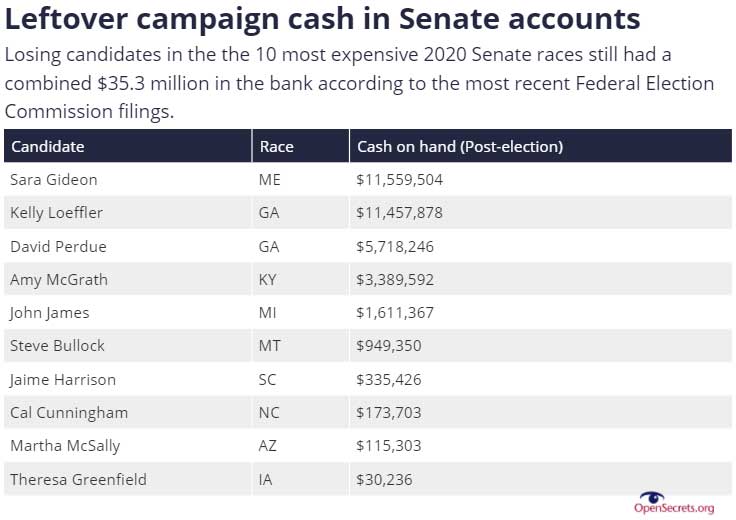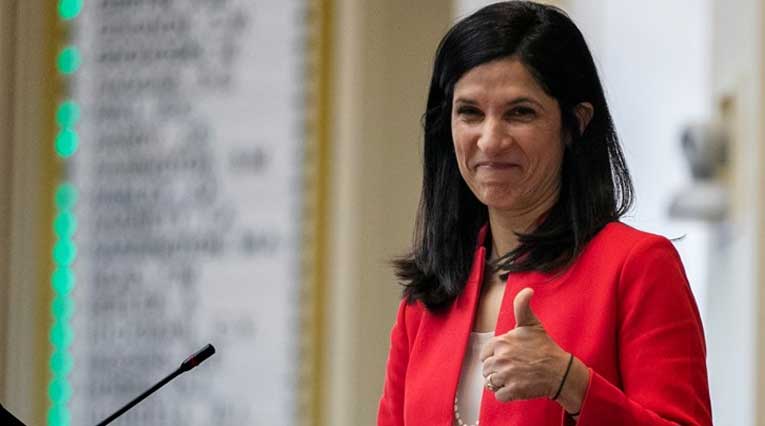Photo: Maine Democrat Sara Gideon still has nearly $11.6 million in the bank after spending $62.9 million in her unsuccessful Senate bid.
Photo Credit: Robert F. Bukaty / AP
Published February 11, 2021
The Center for Responsive Politics [Karl Evers-Hillstrom & Lucia Geng] –
As congressional candidates raked in record sums of campaign cash in the extraordinarily expensive 2020 election, they experienced a unique problem: too much money and not enough time to spend it.
Several candidates who lost their races are sitting on millions in unspent campaign cash. The losers in the 10 most expensive 2020 Senate races still had a combined $35.3 million in the bank according to the most recent Federal Election Commission filings.
Maine Democrat Sara Gideon still has nearly $11.6 million in the bank after spending $62.9 million in her unsuccessful Senate bid.
Former Sen. Kelly Loeffler (R-Ga.), who injected $23.8 million of her own money into her unsuccessful campaign, had roughly $11.5 million in the bank as of late January.

Gideon put some of her leftover money to use shortly after the election. Ahead of the key Georgia runoffs, Gideon’s campaign gave $1 million to the Democratic Senatorial Campaign Committee, $75,000 to Stacey Abrams’ Fair Fight and $75,000 to the Georgia Democratic Party.
Candidates may transfer an unlimited amount of money to affiliated party committees, a rule Michael Bloomberg exploited to send $18 million of his own money to the Democratic National Committee. Campaigns are also allowed to contribute up to $2,000 in each election to another candidate’s campaign.
Campaigns may also make charitable donations, and some former lawmakers have funneled money to their own organizations.
Gideon sent $350,000 in campaign funds to two Maine charities.
Michigan Republican John James, who donated to local charities throughout his unsuccessful Senate bid, donated another $295,000 to Michigan charities in December.
Campaigns can avoid contribution limits by sending money to a super PAC.
Kentucky Democrat Amy McGrath launched a new super PAC using her campaign’s existing infrastructure, constituting a $238,000 in-kind donation. McGrath’s group, Democratic Majority Action, used the campaign’s massive email list to bring in over $1.2 million in a matter of months.
Some losing candidates opt to return their campaign cash to contributors, but they’re not legally required to do so. Former Sen. David Perdue (R-Ga.) issued roughly $637,000 in refunds after he conceded the race to Democrat Jon Ossoff.
Candidates who may be eyeing another political office in the future can choose to keep their campaign committees active. If they decide to make another run for office, they can roll over the money from their old campaign committee into the new one.
Federal law prohibits candidates from using their leftover money for personal expenses, such as buying country club memberships, household food items and clothing. While active campaigns typically have explanations for paying excessive sums on rent or travel, inactive candidates have little justification for spending campaign funds.
Still, a 2018 Tampa Bay Times investigation cataloged dozens of “zombie campaigns,” where the campaigns of former officeholders kept spending money from campaign accounts for years after the campaign’s end. In some cases, staffers continued to spend money from the campaign’s accounts after the former candidate died.
The FEC recommends that outgoing officeholders wrap up and pay all expenses related to winding down office spaces within six months of their departure. In 2019, regulators from the FEC contacted the campaign committees of 50 former officials and gave them a deadline to inform the FEC whether they would shut down. But the FEC has not changed its rules that allow campaign committees of former officeholders to run indefinitely.
Last year, the Campaign Legal Center reported that former members of Congress used leftover campaign cash to make donations to lawmakers they lobbied on behalf of foreign clients. The report, which cited OpenSecrets data, prompted Sen. Michael Bennet (D-Colo.) to introduce the ZOMBIE Act, which would require politicians to close their campaign accounts within six months if they don’t file to run for a federal office during the next election cycle.






